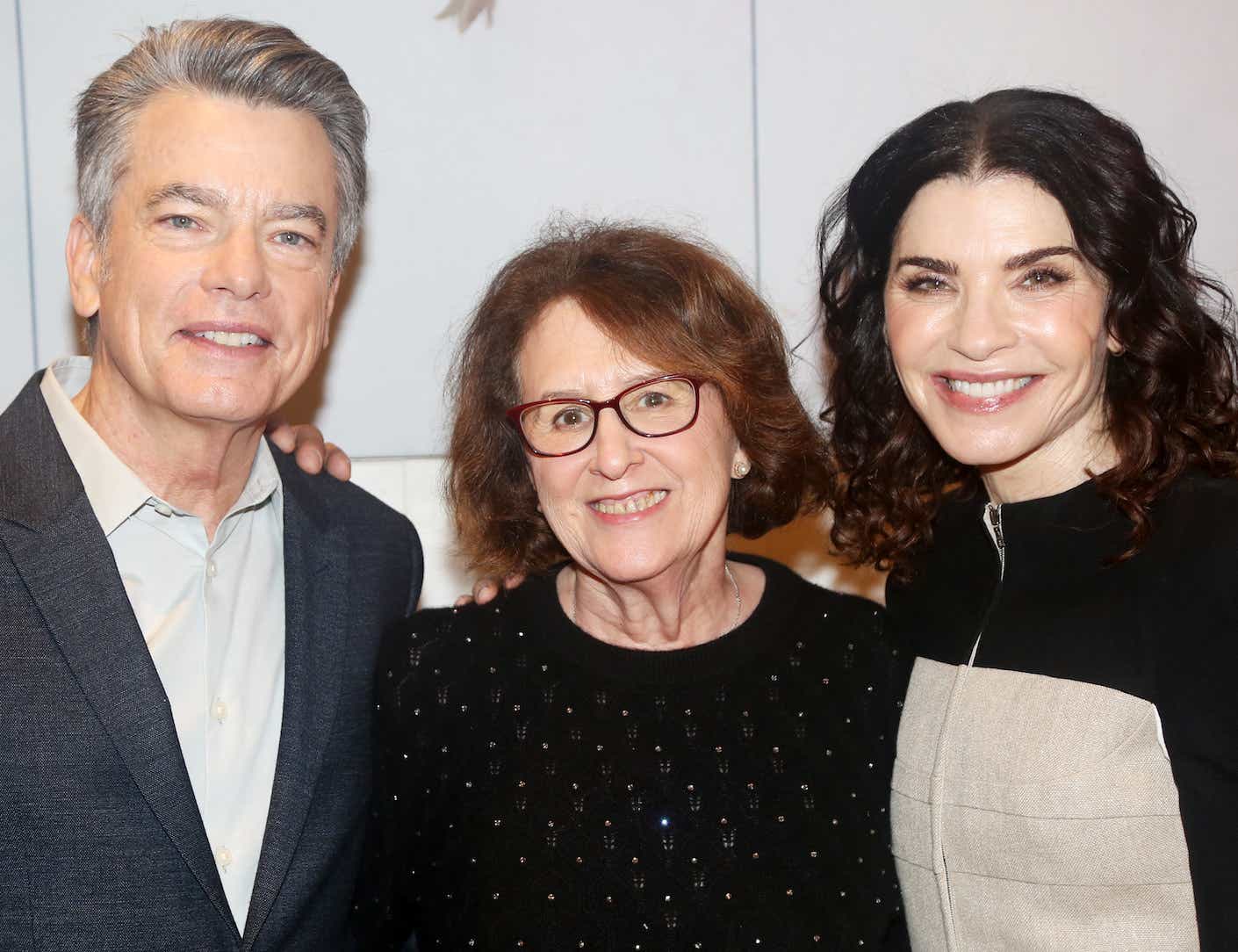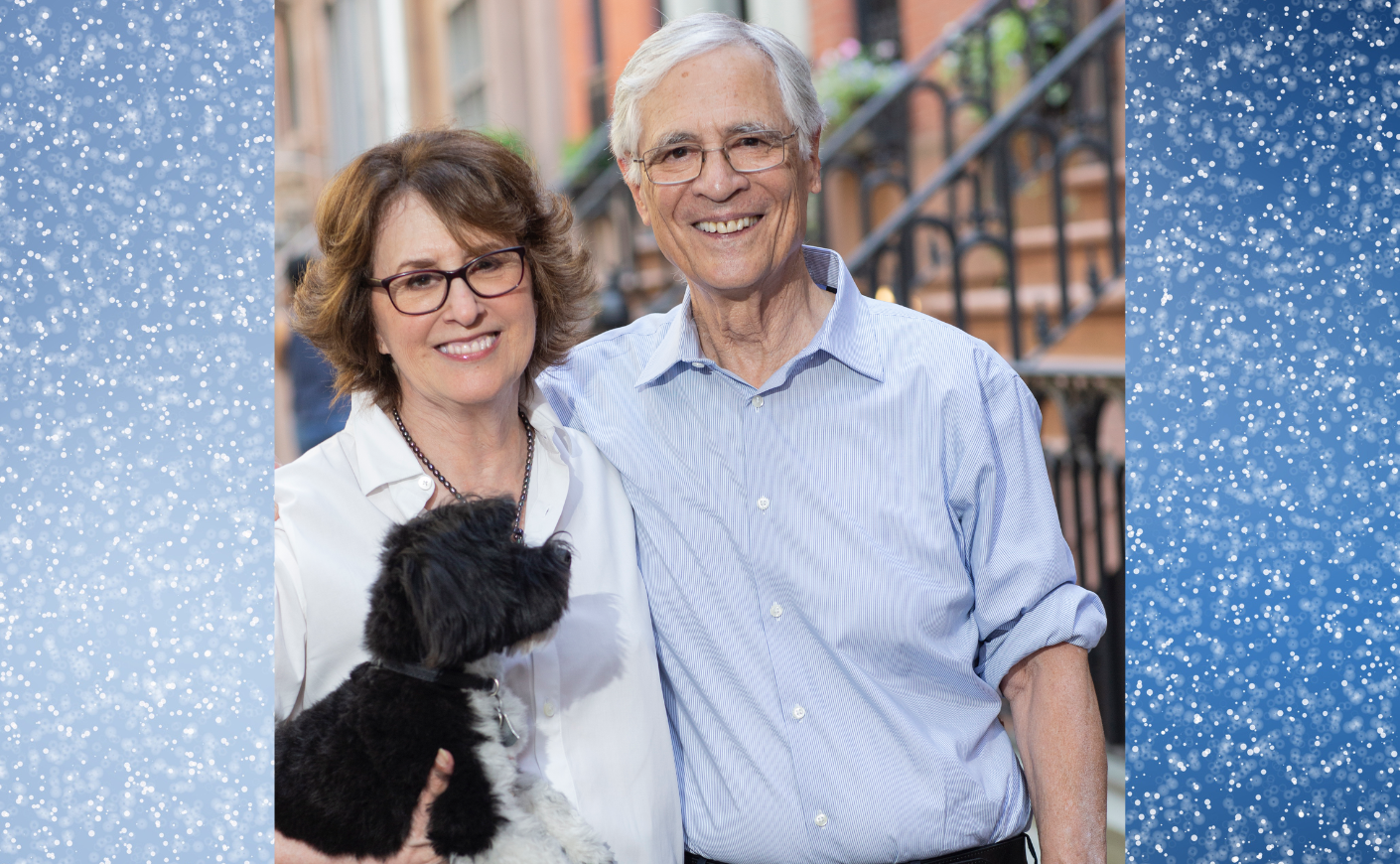When Delia Ephron’s real love life started emulating the fictional one she conjured up for the big screen decades prior, she knew she couldn’t keep the story to herself. Her 2022 memoir, Left on Tenth, follows her journey from widow to newlywed at 72 to leukemia survivor — and includes the meet-cute of her falling for her second husband via email, just like the characters she wrote for the screenplay of the 1998 rom-com classic You’ve Got Mail. Now, the story’s on stage in a Broadway production starring Peter Gallagher as her second husband, and Julianna Margulies as Ephron herself.
We spoke to Ephron about rediscovering romance later in life and overcoming the deaths of her sister — famed writer and filmmaker Nora Ephron — and first husband, and her own near-death battle.
Katie Couric Media: We actually interviewed you when you released your memoir a few years ago. What made you want to put this story on stage?
Delia Ephron: When I was writing my book, I just had this feeling that it could also be a play. I thought it had every single element you could ever want in a story: drama, unexpectedness, miracles. And it was amazing that it all actually happened to me.
The story starts with you grieving your first husband, Jerry, who died of prostate cancer in 2015. As the play progresses, you begin to fall in love with Peter via email. You and Peter were in your 70s when your relationship began. Do you feel like the older people get, the faster romantic relationships develop?
The two men I married, Jerry and Peter, I knew [were a match for me] almost instantly. And I was much younger when I met Jerry, about 35. But I think your 30s are a really critical time in your life, because you have to correct the mess you made in your 20s — I remember thinking how stupid I was about men. There's a line in the play that I love: “People begin as they mean to continue.” And I think that was one of the things I had to learn in my 30s about men: If you notice something off, don't ignore that. I got smarter in my 30s, and then I wasn't really single again until I was 70.
I think when you get older the question becomes, do you have the bravery? Because when I lost Jerry, it was so terrible. And then, instead of thinking, Oh, I'm going to have this wonderful, joyous time with Peter, I just kept thinking, am I going to lose him, too? And you run the risk of denying yourself what could be years of joy and excitement and sex and everything else. You have to get past the terror of starting again. Only then you can fall just as gloriously as you ever did.
Also, at that age, you've got a more established life in so many ways: where you live, who your friends are. And that actually can be great, because when you're younger, you're thinking, Do I want to have children? How am I going to get my career going? Am I going to have an IRA? And by the time you're my age, you've worked that out, so you're not thinking about these other conflicting ambitions. You're really free for the joy.
How did you get past the fear of losing someone again?
You have to be willing to “experience totality” in life, as Peter says in the play, and that means you have to accept that there's going to be this joy, and then there's going to be the pain. And there's no escaping it, so you might as well go for it.
And, of course, I was crazy about Peter because he wasn't pushing me. And we were so attracted to each other, and that's a very big thing.
What advice do you have for people who are grieving a partner and navigating this new version of their life?
You have to grieve them every single way you need to, and there's no escaping the feelings. You can't think, Well, I'm going to skip that feeling. You have to meet whatever is coming at you — the sadness as well as the joy. Don't dodge that either. It's about being open.
What’s the advice you give people struggling to get back out there and welcome this second love into their life while grieving somebody else and navigating a fear of losing someone again?
In a way, that's what the play is: a present to them. The play tells people we all have these experiences of feeling ignored, lonely, and lost. Being a widow — I hate that word and try not to use it — can be rough and lonely. You fall asleep at six at night because you just feel lost in the house. But you know what? There’s something else out there, too — the other side of those feelings. There's joy to be had, there's adventure. I think if there's anything you haven't done in life that you really wanted to do, like a trip you’ve wanted to take, you have to start thinking about those things and going for them. Life is just a continual cycle of joy and pain. And they can coexist.
You had this unbelievable health experience shortly after meeting Peter: being diagnosed with leukemia, which is what your sister Nora Ephron died of, and undergoing a grueling bone marrow transplant that nearly killed you. What's your perspective on life and aging after all of that?
I used to think that there was such a thing as luck, but now I think that every teeny piece of luck is actually a small miracle. If you get to the subway platform and the subway comes right away, that’s not luck; that’s a miracle.
And then you have to look at your life in this bigger way — there are little miracles all over the place that are happening to you all the time. And in my case, my story ended up on Broadway. I can't even believe it. Sometimes, there are miracles so big you don't have the nerve to dream of them.
When your life started emulating a rom-com that you could have written — in fact, very similar to one you did write, You’ve Got Mail — what did that feel like?
I mean, there I was: I had written You’ve Got Mail, and I was falling in love with a man over emails. But life isn’t a romantic comedy, and real life came into play. Shortly after that, I was diagnosed with a terrible disease. In romantic comedies, people just come together and the story doesn’t go further than that. Life is much more complicated. And the play is much more complex than a rom-com, but just as full of joy.
What do you think Nora would think of how this all unfolded?
I know Nora; she'd just say, “Go, Delia!” She would've loved everything about it.
Is she in your head as you write?
She's not in my head when I write, but she's often in my head in the grocery store because she had so many opinions about food. And I have a ping pong table in my new apartment, and I know if Nora were alive, I would not. I would have called her up and asked, “Should I get a ping pong table?” And she would have said, “Absolutely not, Delia, it's out of the question.” We were close. And God knows she had more opinions than anybody I've ever known. I think she would have been so proud of me, though.
Nora really taught me everything. Any time I had writing problems, she and my first husband, Jerry, who was also a writer, knew how to solve them. He was an unbelievable dramatist, and he taught me drama. And she was great fun.

There’s this new wave of content about older people dating, like The Golden Bachelor and movies like Book Club. Where do you think that’s coming from?
People are just living longer. I think the average lifespan is like 85 or something; it's really, really high. And they make up a huge part of the population — the audience is there. So what are their lives about? And how can we explore those lives in more fun and interesting ways? I think the movie business has always skewed young, and ridiculously so, and many actresses would have to stop working at 35. But that's not true anymore. And it reflects the population.
Do you think there's a road on which this becomes a movie at any point?
Well, it's been sold for a movie. Will it get made? I mean, that's the world of movies. You never know.













